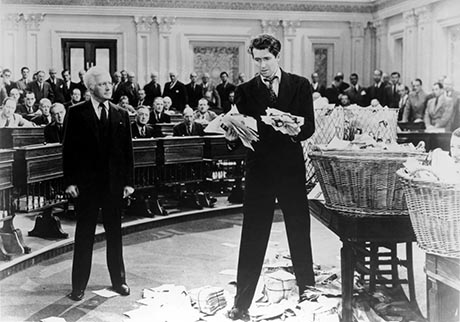Director Frank Capra was a great filmmaker, but he used his talent to promote a utopian vision that never existed and never can exist. Capra was a progressive who clearly believed in the perfectibility of man — if only more people would faithfully follow the civic religion that worships the goodness of the “common man.”
In “Mr. Smith Goes to Washington,” Capra’s Jefferson Smith (memorably played by Jimmy Stewart) is a small-town nobody who’s suddenly propelled into Washington politics when he’s appointed to the U.S. Senate. Smith is a wide-eyed innocent who’s surrounded by crooks and thieves. He just wants to use the power of government to do good — for the boys of an organization he works with, mostly — but everyone else is in it for money and power.
It’s a good movie, even if it’s really corny and wildly two dimensional. If you watch it, you have the idea that everything could be great in this country if we would just trust the simpletons such as Smith, who live in the uncorrupted small towns of the country, far from the influence of the evils of Washington.
Those who believe in this great civic religion place a lot of their faith in government at the local level, as though there’s something magical and honest about a mayor or city council of 10,000 people — as opposed to the evil bigwigs in Washington or even some state capital.
The truth, though, is very different. The truth is that the evils of corruption and deception that Capra liked to show in his films are at least as evident at the small-town level. It might even be worse.
I was thinking about that Friday afternoon as I drove through a small city near my suburb. We’re in the midst of municipal elections in Alabama, so there are campaigns for mayor and city council going on everywhere. If you happen to know the stories behind these pure little hometown civic contests, you know out that they’re every bit as venal and corrupt as is politics at any other level.
If you listen to the people who run for these offices, they’re all in it for the common good. In reality, they’re frequently busybodies who simply like to be in charge. I can have at least some respect for the ideologues, although there aren’t that many of them, because they at least stand for something when they run. The people who scare me are those who simply think they’re smarter than everybody else — and who think they ought to be allowed to make up the rules that everyone else has to live by.
I started thinking about that driving through the nearby town — which I won’t name — because I happen to know some of the personalities involved. Some of the candidates (and incumbents) are simply control freaks. They don’t have much in the way of controlling principles. They just think they should be the ones who get to decide things — what kinds of signs people should have, who gets to do what with his property and a thousand other things that vary from place to place.
One of the questions that I commonly ask politicians is why they’re running for office. I get some interesting answers. I recently met a guy who’s a member of a city council in an upscale suburb of Birmingham and I asked him. Most of them at least try to pretend at first that it has to do with a desire to help people. But this guy didn’t bother. We were talking privately, so he just told me the truth.
“It’s really good for my business,” he said. “Lots of people who want favors from the city do business with me now so that I’ll help them out when they need something. So it’s worth a lot of money to me.”
And how do these races get funded? Are they all fueled by nickels and dimes of proud moms and brothers and neighbors who believe in these people? Every now and then, yes. Almost all the time, no. The races are funded by people who stand to gain something by having someone in office who’s sympathetic to his company or organization. Just this week, I had a professional tell me that he has to raise a lot of money in the next week for politicians in his town — because the “right” people being in office send a tremendous amount of money his way.
“It’s really because I care so much about the people,” he sarcastically joked.
If you talk to some of the people I’m talking about, you would assume it’s the people to blame. If we could just get the corrupt people out of the way — and trust the Jefferson Smiths of the world — government could do good for everyone. That’s certainly what Frank Capra wanted you to believe.
The truth is that the problem isn’t the individuals. The problem is the system itself. The problem is a system that gives anyone the right to make decisions and force other people to obey them.
As long as this coercive system is in place, it doesn’t matter whether the politicians involved are in Washington, in Sacramento or suburban Birmingham. The local folks might not be as slick. The dollars at stake might not be as huge. But as long as there’s control to be seized and money to be gained, evil people will find their way into power. What’s worse, even “good people” become evil when they start making decisions and insisting that others obey.

 Brush with high-speed blowout leaves me thinking about death
Brush with high-speed blowout leaves me thinking about death Sudden realization of hunger for taste of kindred soul is killing me
Sudden realization of hunger for taste of kindred soul is killing me